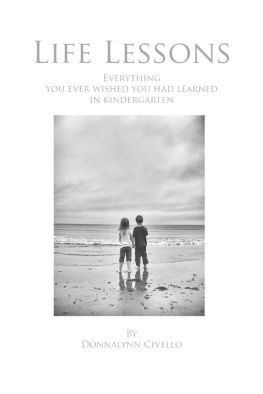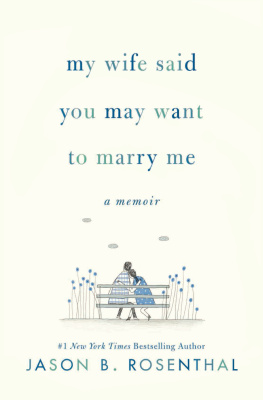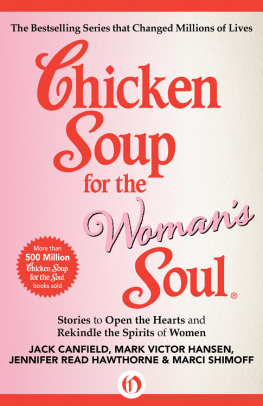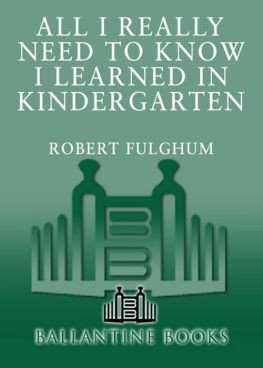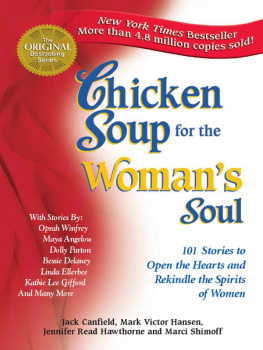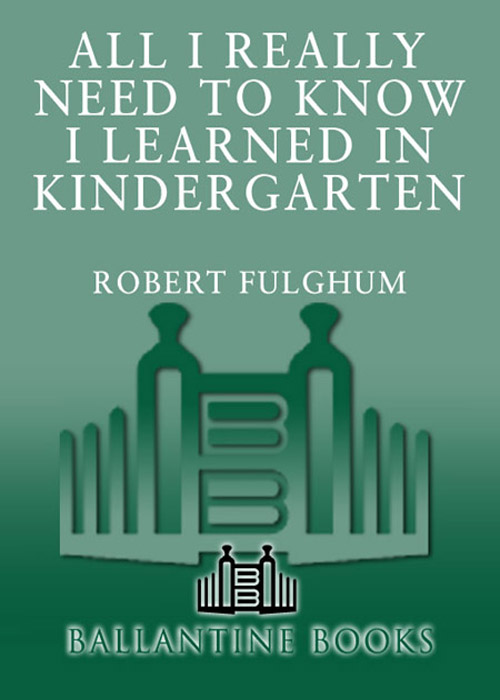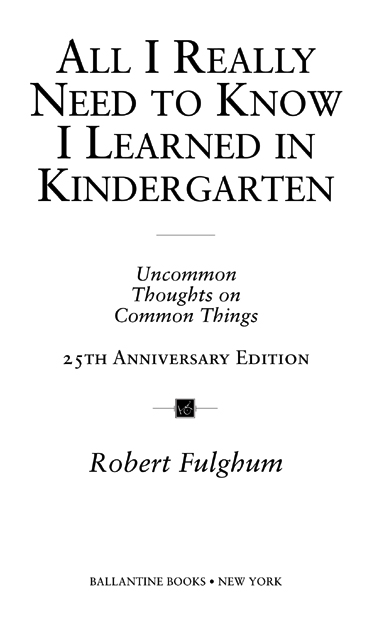CONTENTS
ALL I REALLY
NEED TO KNOW
I LEARNED IN
KINDERGARTEN
PERSPECTIVE
THE MAGIC MOMENT WHEN I FIRST saw Kindergarten in a booksellers window remains vivid. I went in and bought one. The clerk didnt recognize me. She knew little about the booka slim new volume of essays with a long titlewritten by an unknown author.
The odds were high in favor of a short life for my first book, and a short career for me as a writer.
Now, a quarter of a century later, Kindergarten remains alive and well. Over six million copies are in print in English alone. It has been published in thirty-seven languages and sold in one hundred and three countries. Word-of-mouth publicity sustains Kindergarten, aided in part by the three thousand productions of the theater piece that was created from it.
Ten years ago Kindergarten was reconsidered, revised, and ex-panded with twenty-five new essays. My thought at the time was, Yes, thats it. Nothing compels me to make any further changes.
As for the author, I also remain alive and well. Five more books of essays and stories have been published; plus a book on the rituals of life, another about love, a book of quotations, and two novels. And now the manuscript of a memoir, a new book of essays, and a musical are in production.
Furthermore, Im still going about looking at the world, trying to make sense of what I notice, and passing that along on my web-site: www.robertfulghum.com.
The writing continues because I continuewith the same atti-tude that was the basis for Kindergarten: That which is essential to a flourishing life is elemental and near by in daily life.
If you read the first essays in this book and realize that you know and trust these values, then you know that the truth expressed is not mineit is yours, as well, and ours.
Robert Fulghum

CREDO
To begin with, did I really learn everything I need to know in kindergarten? Do I still believe that? Here is the original essay, followed by my editorial reaction.
EACH SPRING, FOR MANY YEARS, I have set myself the task of writing a personal statement of belief: a Credo. When I was younger, the statement ran for many pages, trying to cover every base, with no loose ends. It sounded like a Supreme Court brief, as if words could resolve all conflicts about the meaning of existence.
The Credo has grown shorter in recent yearssometimes cynical, sometimes comical, and sometimes blandbut I keep working at it. Recently I set out to get the statement of personal belief down to one page in simple terms, fully understanding the nave idealism that implied.
The inspiration for brevity came to me at a gasoline station. I managed to fill my old cars tank with super deluxe high-octane go-juice. My old hoopy couldnt handle it and got the willieskept sputtering out at intersections and belching going downhill. I understood. My mind and my spirit get like that from time to time. Too much high-content information, and I get the existential willies. I keep sputtering out at intersections where life choices must be made and I either know too much or not enough. The examined life is no picnic.
I realized then that I already know most of whats necessary to live a meaningful lifethat it isnt all that complicated. I know it. And have known it for a long, long time. Living itwell, thats another matter, yes? Heres my Credo:
ALL I REALLY NEED TO KNOW about how to live and what to do and how to be I learned in kindergarten. Wisdom was not at the top of the graduate-school mountain, but there in the sandpile at Sunday School. These are the things I learned:
Share everything.
Play fair.
Dont hit people.
Put things back where you found them.
Clean up your own mess.
Dont take things that arent yours.
Say youre sorry when you hurt somebody.
Wash your hands before you eat.
Flush.
Warm cookies and cold milk are good for you.
Live a balanced lifelearn some and think some and draw and paint and sing and dance and play and work every day some.
Take a nap every afternoon.
When you go out into the world, watch out for traffic, hold hands, and stick together.
Wonder. Remember the little seed in the Styrofoam cup: The roots go down and the plant goes up and nobody really knows how or why, but we are all like that.
Goldfish and hamsters and white mice and even the little seed in the Styrofoam cupthey all die. So do we.
And then remember the Dick-and-Jane books and the first word you learnedthe biggest word of allLOOK.
Everything you need to know is in there somewhere. The Golden Rule and love and basic sanitation. Ecology and politics and equality and sane living.
Take any one of those items and extrapolate it into sophisticated adult terms and apply it to your family life or your work or your government or your world and it holds true and clear and firm. Think what a better world it would be if we allthe whole worldhad cookies and milk about three oclock every afternoon and then lay down with our blankies for a nap. Or if all governments had as a basic policy to always put things back where they found them and to clean up their own mess.
And it is still true, no matter how old you arewhen you go out into the world, it is best to hold hands and stick together.

DEEP KINDERGARTEN
AS I WRITE THIS I am sixty-five years old. Not so old, really, but I have been around awhile. Kindergarten is a long way back there. What do I know now?
The Kindergarten Credo is not kid stuff.
It is not simple. It is elemental.
The essay answers the questions asked sooner or later by every one of us who once stared out a classroom window wondering: Why am I here? Why do I have to go to school?
We are sent to school to be civilizedto be introduced to the essential machinery of human society. Early on in our lives we are sent out of the home into the world. To school. We have no choice in this. Society judges it so important that we be educated that we must go. It is the law. And when we get to school we are taught the fundamentals on which civilization rests. These are first explained in language a small child understands.
For example, it would do no good to tell a six-year-old that Studies have shown that human society cannot function without an equitable distribution of the resources of the earth. While this statement is profoundly and painfully true, a child cannot comprehend this vocabulary. So a child is told that there are twenty children and five balls to play with; likewise four easels, three sets of blocks, two guinea pigs, and one bathroom. To be fair, we must share.
Likewise a six-year-old will not understand that By and large it has been demonstrated that violence is counterproductive to the constructive interaction of persons and societies. True. But a child can better understand that the rule out in the world and in the school is the same: Dont hit people. Bad things happen. The child must understand this rule is connected to the first rule: People wont share or play fair if you hit them.


